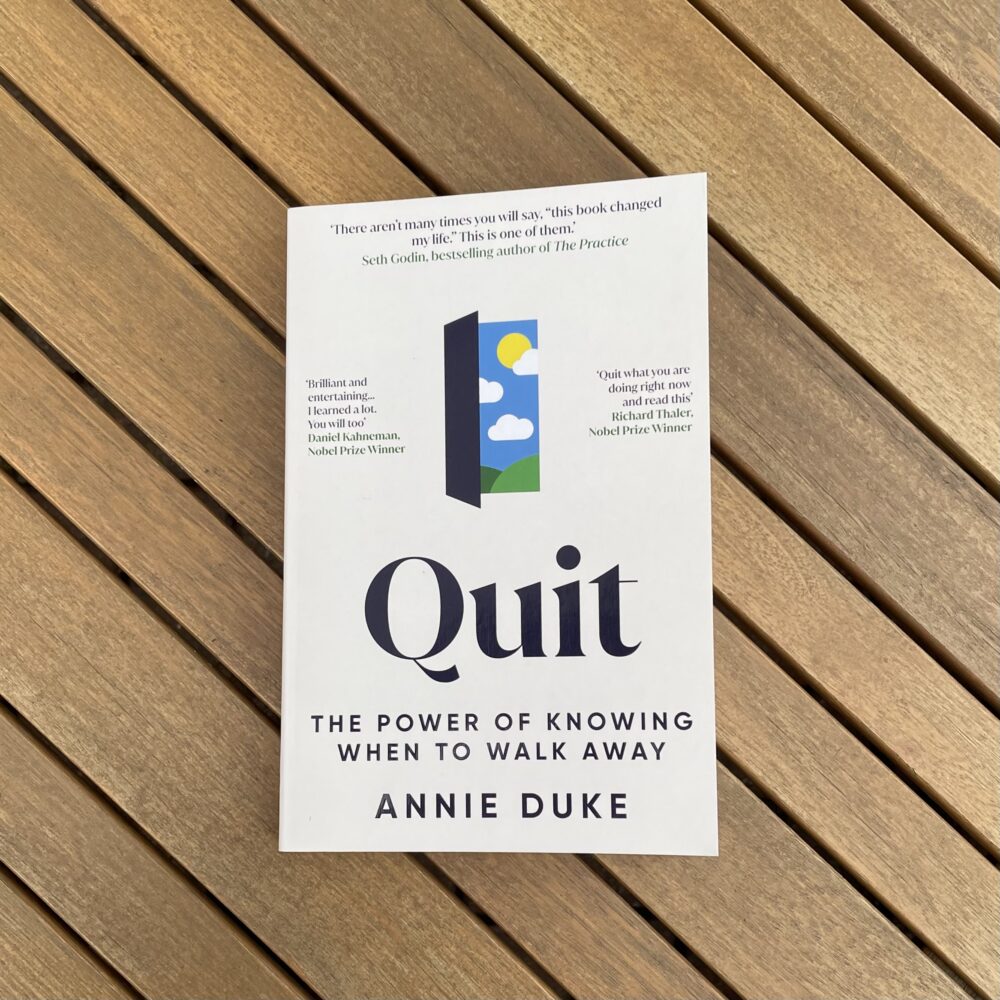I’ve been reading ‘Quit’ by Annie Duke

This 2022 popular science book by Annie Duke is focused on when we should walk away from an endeavour. Its thesis is that we tend to over-celebrate ‘grit’ as a characteristic, even where to ‘quit’ would be the most beneficial option. I picked the book up after reading about it in Trung Phan’s email newsletter, which gives a much more complete summary of the key messages.
Duke’s central argument is reasonable: I see overcommitment both in profession and in other areas of life. Within my own team, I’m the hard-wired ‘quitter’: I’m often the person challenging the team whether processes or ways of working are still serving their intended purpose, or ought to be stood down. There are few things that frustrate me as much as attending regular meetings which have outlived their purpose. Emails asking for suggestions of things to be discussed at future meetings are a pet hate of mine: the meeting should not have been arranged until it was apparent that there was something to discuss.
I found insight in Duke’s discussion of the link between identity and positions which run counter to the general consensus. I recognise this in myself.
However, as so often in popular science, I think Duke pushes her ideas too far. Duke seems to have the view that if only humans were more economically rational, their lives would be better. I profoundly disagree. I think Duke misses the point that economics is a science which tries to describe human behaviour, but which does so imperfectly, rather than a perfect science that humans fail to live up to. I think our irrationality is part of what makes us human, and is the source of a lot of beauty and joy in the world.
To give a specific example: Duke makes the argument that we should ignore sunk costs by suggesting that if we would not accept a free ticket to an event as a result of the prevailing weather conditions, then we should also not attend that event if we had pre-purchased a ticket. Duke’s argument is that the rational basis for decision-making is the expected future value, and that this does not differ between the two scenarios.
This argument fails on two fronts.
Firstly, the expected future value does vary in the two scenarios. To make only the most obvious point, if I have paid for a ticket and then decide not to go to an event, my willingness to pay for tickets in future may change because of the psychological burden of that decision. The same does not apply to an offer of a free ticket.
Secondly, the expected future value is not the only relevant consideration. The fact that we view situations with the same expected future value different is a feature of the human condition, not a bug. Our financial position might be improved by being ever-rational, but our lives would be very much poorer.
Duke also talks about ‘kill criteria,’ an idea from military and economic strategy which suggests that, when embarking on an endeavour, we ought to set criteria that would direct us to quit. This helps decision-makers to avoid over-committing to a losing position, such as continuing in a battle with too few helicopters, or continuing to invest in a business that is not growing as expected. ‘Kill criteria’ make sense in these settings.
But, Duke argues, we ought to be equally ruthlessly rational in other parts of life. She suggests that we ought to set a time limit on after which we end a relationship if marriage isn’t proposed. She recommends that we plan to quit a job if we haven’t secured an appropriate promotion within a pre-set time limit. I think this advice is appalling—it allows no room for learning and growth to change our priorities or our view of the world. The way our views change as we progress through life is one of the joys of humanity. We might hope that a new partner will alter our view of what relationships mean, or that the experience provided by a job will alter our desired career trajectory. Setting ‘kill criteria’ on things like this, and sticking to them, sounds like a bleak way to live life.
This is minimally explored in the final section of the book, but more from the point of view of diversifying your skills and assets to protect against external shocks like a company going bust, rather than from the point of view of learning and developing yourself, and growing as a person.
In the end, I felt that this book promoted an unfamiliar and possible unfamiliar goal-orientated approach to living life. I found this uncomfortable, and I am not confident that it is healthy advice.
I think it’s helpful to read books that make me a bit uncomfortable and give me new perspectives and ideas. This book made me reflect on my response to it, and I probably understand myself a little better as a result. However, ultimately, I don’t think I took much of value away from the book itself, and it isn’t one that I’d recommend to other people.
This post was filed under: Post-a-day 2023, What I've Been Reading, Annie Duke, Trung Phan.